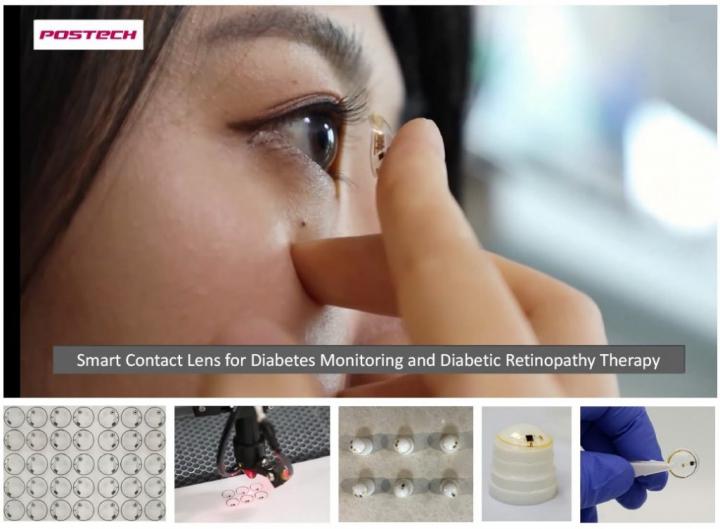Smart contact lenses that diagnose and treat diabetes

Professor Sei Kwang Hahn's team at POSTECH develops wireless smart contact lenses for diagnosis and treatment of diabetes. Credit: Sei Kwang Hahn (POSTECH)
Recently, a research team at POSTECH developed wirelessly driven 'smart contact lens' technology that can detect diabetes and further treat diabetic retinopathy just by wearing them.
Professor Sei Kwang Hahn and graduate students Do Hee Keum and Su-Kyoung Kim of POSTECH's Department of Materials Science and Engineering, and Professor Jae-Yoon Sim and graduate student Jahyun Koo of Department of Electronics and Electrical Engineering have developed a wireless powered smart contact lens that can diagnose and treat diabetes by controlling drug delivery with electrical signals.
The findings were recently published in Science Advances, a world-renowned journal. The smart contact lenses developed by the research team are made of biocompatible polymers and integrate biosensors and drug delivery and data communication systems.
The research team verified that the glucose level in tears of diabetic rabbits analyzed by smart contact lenses matched their blood glucose level using a conventional glucose sensor that utilize drawn blood. The team additionally confirmed that the drugs encased in smart contact lenses could treat diabetic retinopathy.
Recently, by applying the platform technology of these smart contact lenses, a research has been conducted to expand the scope of electroceuticals that use electrical stimulations to treat brain disorders such as Alzheimer's and Parkinson's diseases, and mental illnesses including depression.
The research team expects this development of self-controlled therapeutic smart contact lenses with real-time biometric analysis to be quickly applied to wearable healthcare industries.
Professor Sei Kwang Han who led the research stated, “Despite the full-fledged research and development of wearable devices from global companies, the commercialization of wireless-powered medical devices for diagnosis and treatment of diabetes and retinopathy is insufficient.”
He added, “We expect that this research will greatly contribute to the advancement of related industries by being the first in developing wireless-powered smart contact lenses equipped with drug delivery system for diagnosis and treatment of diabetes, and treatment of retinopathy.”
This research was financially supported by Samsung Science and Technology Foundation, the Global Frontier Project (Director: Professor Kilwon Cho), the Mid-career Researcher Program from the National Research Foundation of Korea, and World Class 300 Project of the Ministry of SMEs and Startups.
The research findings on smart contact lens-based technologies were introduced in the January issue of Nature Reviews Materials, which drew attention from the academic circles. The research team is preparing to carry out clinical trials for the safety and validity assessment for commercialization of smart contact lenses in collaboration with Interojo Inc.
Media Contact
Jinyoung Huh
jyhuh@postech.ac.kr
82-542-792-415
Media Contact
All latest news from the category: Health and Medicine
This subject area encompasses research and studies in the field of human medicine.
Among the wide-ranging list of topics covered here are anesthesiology, anatomy, surgery, human genetics, hygiene and environmental medicine, internal medicine, neurology, pharmacology, physiology, urology and dental medicine.
Newest articles

High-energy-density aqueous battery based on halogen multi-electron transfer
Traditional non-aqueous lithium-ion batteries have a high energy density, but their safety is compromised due to the flammable organic electrolytes they utilize. Aqueous batteries use water as the solvent for…

First-ever combined heart pump and pig kidney transplant
…gives new hope to patient with terminal illness. Surgeons at NYU Langone Health performed the first-ever combined mechanical heart pump and gene-edited pig kidney transplant surgery in a 54-year-old woman…

Biophysics: Testing how well biomarkers work
LMU researchers have developed a method to determine how reliably target proteins can be labeled using super-resolution fluorescence microscopy. Modern microscopy techniques make it possible to examine the inner workings…





















